
Balance and Betrayal
1 Peter 5:8-9Amplified Bible (AMP)
8 Be sober [well balanced and self-disciplined], be alert and cautious at all times. That enemy of yours, the devil, prowls around like a roaring lion [fiercely hungry], seeking someone to devour. 9 But resist him, be firm in your faith [against his attack—rooted, established, immovable], knowing that the same experiences of suffering are being experienced by your brothers and sisters throughout the world. [You do not suffer alone.] Knowing this, it can still be hard to navigate balance and betrayal.
Abuse survivors know betrayal, especially child abuse and child sexual abuse (CSA) victims. The people who should have taken care of us, the ones who should have loved us with a self-sacrificing love, the ones who were entrusted with our care turned on us and damaged us in ways only our creator can fully understand and heal. We may have trouble with balance because of the core violation and betrayal.
CSA causes imbalances. Physical, spiritual, mental and emotional imbalances result from the core violation of this betrayal.
The physical manifestations are not always fully clear, even into adulthood. Parasympathetic responses and PTSD symptoms can be triggered by a multitude of stimuli from sights, sounds, smells, tastes, and sensations. Involuntary recoil or tremors or unusual pains can be a part of body memory, even when our conscious mind has blocked out the things that happened.
Finding Balance Despite Betrayal
Spiritual imbalance doesn’t have to originate with abuse at church or by religious people. When we hear that there is a loving God who wants to protect us and He is supposedly all powerful, but He didn’t stop the abuse, we cannot help but be dismayed. God obviously doesn’t care about us. Or He isn’t who He says He is. It’s all a lie. The truth is that we live in a fallen world, full of terrible things because our creator gave people free will. People are the problem, not God.
Mental imbalance comes from the stunted growth of the prefrontal cortex of our brains when we’ve suffered abuse during our formative years. During the time when our brains should be developing higher executive reasoning, we are in survival mode. Trying to figure out how to protect ourselves from real and perceived mortal danger from moment to moment doesn’t leave time or energy for strategic thought. The betrayal has conditioned us to be constantly aware of the fact that we are not ok and that people may hurt us at any given moment. Being on guard this way establishes negative thoughts and rigid neural pathways.
Emotional imbalance may manifest in numerous ways. A child may act out; constantly disruptive, angry and possibly violent or re-enact the trauma. He or she might withdraw; remaining quiet and even silent, unengaged in family events or school activities, making excuses to be alone. Another manifestation of emotional imbalance may be somatic disturbances; the physical expression of emotions that for one reason or another are not expressed any other way. Headaches and stomach aches are common when children are not able to process their emotions of fear and confusion.
So, how do we remain balanced?
Let’s consider some activities that require great balance. Ice skating, water skiing, surfing, gymnastics, and dance are some. What is the common denominator between the people who excel at these?
Practice. Right? In order to be a great surfer, like Duke Kahanamoku, who was named surfer of the century, you’d expect to practice. You’d expect a lot of practice.
So, how are we supposed to be well balanced and self-disciplined with all the imbalances inflicted upon us?
The same way athletes become well balanced and self-disciplined. It takes focused effort and consistent practice. Sounds like I’m being simplistic, but although the solution is simple the process is anything but.
I did much of this on my own in my 20s, but there is lots of help available now. Self-help books, videos, courses, peer counseling and professional counseling are all options for us today. I started with naming emotions. You might need to start with controlling anger. Whatever you do, choose one thing to work on and stick to it every day. Don’t be in a rush. Slow progress is still progress. If you and I overwhelm our systems with too many issues at once, it would be like getting out in the ocean to catch a big wave without any training.
I used the Word of God. By memorizing the Scriptures that related to my many issues, the supernatural power of the Word changed my reactions and helped me get stronger and more disciplined and eventually, more well balanced. I called the Bible a handbook for life. We can find any problem in there and the corresponding answer. I learned how to build a good life out of the brokenness and pain of childhood trauma.
If you have suffered CSA, I believe you can find your way through balance and betrayal.



